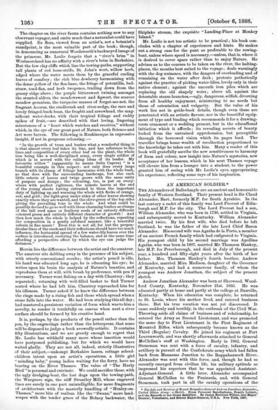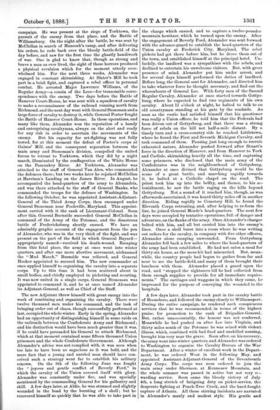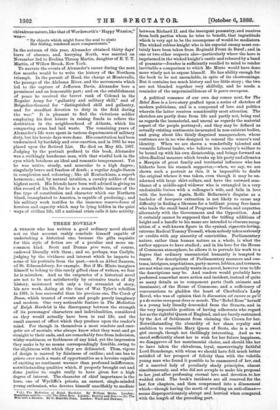AN AMERICAN SOLDIER.*
THE Alexanders of Ballochmyle are an ancient and honourable- family of Western Scotland. Their present head is Sir Claud Alexander, Bart., formerly M.P. for South Ayrshire. In the last century a cadet of this family was Lord Provost of Edin- burgh and M.P. for the city. The Lord Provost had a son,. William Alexander, who was born in 1730, settled in Virginia,, and subsequently moved to Kentucky. William Alexander married twice. By his first wife, who died before he left. Scotland, he was the father of the late Lord Chief Baron Alexander. His second wife was Agatha de is Porte, a member of an ancient French family which had emigrated to Virginia_ His youngest child by his second marriage was Apolline- Agatha, who was born in 1807, married Mr. Thomson Hankey, late M.P. for Peterborough, and died in July of the present year, a hundred and fifty-eight years after the birth of her father. Mrs. Thomson Hankey's fourth brother, Andrew- Alexander, married Mira Madison, daughter of the Governor- of Kentucky, and had a numerous family, of whom the- youngest was Andrew Jonathan, the subject of the present sketch.
Andrew Jonathan Alexander was born at Sherwood, Wood- ford County, Kentucky, November 21st, 1833. He was. educated partly at home and partly at the college at Danville,. Kentucky. When his education was complete, he returned to St. Louis, where his mother lived, and entered business. there. But his true vocation was not yet discovered. It. came suddenly and terribly, in the outbreak of the Civil War. Throwing aside all claims of business and of relationship, he entered the Army as Second Lieutenant, and was promoted the same day to First Lieutenant in the First Regiment of Mounted Rifles, which subsequently became known as the. Third (Regular) Cavalry. He joined his regiment at Fort. Leavenworth, and was shortly afterwards attached to General McClellan's staff at Washington. Early in 1862, General Stoneman was sent with a force of cavalry, infantry, and artillery in pursuit of the Confederate army which had fallen back from Manassas Junction to the Rappahannock River.. Alexander was sent with this force, and, though he had so recently emerged from civilian life, his military aptitude so impressed his superiors that he was appointed Assistant- Adjutant-General. A little later, Alexander accompanied General McClellan to the Peninsula, and, with General Stoneman, took part in all the cavalry operations of the-
• The Life and Services of Brevet Brigadier-General Andreae Jonathan Alexander,. United States Army a Sketch. From Personal Recollections, Family Letters,. and the Records of the Great Rebellion. By James Harrison Wilson, late Major- General, Volunteers, and Brevet Major•Cenrsl, U.S.A. New York, 1887.
campaign. He was present at the siege of Yorktown, the pursuit of the enemy from that place, and the Battle of Williamsburg. On the night after the battle, he was sent by McClellan in search of Hancock's camp, and after delivering his orders, he rode back over the bloody battle-field of the day before, and saw for the first time the ghastly handiwork of war. One is glad to know that, though as strong and brave a man as ever lived, the sight of these horrors produced a physical revulsion which for the moment utterly over- whelmed him. For the next three weeks, Alexander was engaged in constant skirmishing. At Slater's Mill he took part in a brisk fight, and captured a rebel officer in personal combat. He arrested Major Lawrence Williams, of the Regular Army—a cousin of the Lees—for treasonable corre- spondence with the enemy. Two days before the Battle of Hanover Court-House, he was sent with a squadron of cavalry to make a reconnaisance of the railroad running north from Richmond, and the next day went with General Stoneman and a large force of cavalry to destroy it, while General Porter fought the Battle of Hanover Court-House. In these operations, and many like them, Alexander won the reputation of a handy and enterprising cavalryman, always on the alert and ready for any risk in order to ascertain the movements of the enemy. But his capacity for set-fighting was not fully tested, for at this moment the defeat of Porter's corps at Gaines' Mill, and the consequent separation between the main army and Stoneman's division, compelled the united forces to retreat to Yorktown, which they did by a night march, illuminated by the conflagration of the White House on the Pamnnkey River. At Yorktown, Alexander was attached to the staff of General Van Alen, who commanded the defences there ; but two weeks later he rejoined McClellan at Harrison's Landing on the James River. In August, he accompanied the head-quarters of the army to Alexandria, and was there attached to the staff of General Banks, who commanded the troops for the defence of Washington. In the following October, he was appointed Assistant-Adjutant- General of the Third Army Corps, then encamped under General Stoneman near Pooleville, Maryland. This appoint- ment carried with it the rank of Lieutenant-ColoneL Soon after this, General Burnside succeeded General McClellan in command of the Army of the Potomac, and the disastrous battle of Fredericksburg shortly ensued. We have an admirably graphic account of the engagement from the pen of Alexander, who was in the very thick of the fight, and was present on the part of the field in which General Bayard— appropriately named—received his death-wound. Escaping from this fatal place, the army at once went into winter quarters, and after one more abortive movement, nicknamed the " Mud March," Burnside was relieved, and General Hooker appointed to succeed him. The new commander at once applied himself to organising the cavalry into a separate corps. Up to this time it had been scattered about in small bodies, and chiefly employed in picketing and scouting. It was now united in a single corps, General Stoneman was appointed to command it, and he at once named Alexander its Adjutant-General, as well as Chief of the Staff.
The new Adjutant threw himself with great energy into the work of combining and organising the cavalry. There were twelve thousand men under his command, and the task of bringing order out of chaos, though successfully performed at last, occupied.the whole winter. Early in the spring, Alexander had an opportunity of distinguishing himself in some raids on the railroads between the Confederate Army and Richmond ; and his distinction would have been much greater than it was, if he could have persuaded his General to attack Richmond, which at that moment contained some fifteen thousand Union prisoners and the whole Confederate Government. Although Alexander's advice was not complied with, it was seen when too late to have been as sagacious as it was bold, and the mere fact that a young and untried man should have con- ceived such a strategy went far to establish his military renown. On the 9th of the following June was fought the " joyous and gentle conflict of Beverly Ford," in which the cavalry of the Union covered itself with glory. Alexander was constantly under fire, and was specially mentioned by the commanding General for his gallantry and skill. A few days later, at Aldie, he was stunned and slightly wounded in the head by the bursting of a shell ; but he recovered himself so quickly that he was able to take part in the charge which ensued, and to capture a twelve-pounder mountain howitzer, which he turned upon the enemy. After
the engagement of Beverly Ford, Alexander was sent forward with the advance-guard to establish the head-quarters of the Union cavalry at Frederick City, Maryland. The rebel pickets had got there before him, but he drove them out of the town, and established himself at the principal hotel. Un- luckily, the landlord was a sympathiser with the rebels, and declined to entertain his unwelcome visitors. But, with great presence of mind, Alexander put him under arrest, and for several days himself performed the duties of landlord. Before long, the General sent for Alexander, and directed him to take whatever force he thought necessary, and find out the whereabouts of General Lee. With forty men of the Second Regular Cavalry, Alexander at once started towards Gettys- burg, where he expected to find two regiments of his own. cavalry. About 11 o'clock at night, he halted to talk to an old countryman standing at his gate by the roadside. As soon as the rustic had satisfied himself that his questioner was really a Union officer, he told • him that the Federals had been driven out of Gettysburg, and that there was a strong force of rebels on the hill not half-a-mile distant. By a. timely turn and a cross-country ride he reached Littletown, where he found the First and Seventh Michigan Cavalry, and took command of them. Pausing just long enough to recruit. exhausted nature, Alexander pushed forward after Stuart's. force in the direction of Hanover, and from Hanover to York and Carlisle, skirmishing heavily all the time, and capturing some prisoners, who disclosed that the main army of the Confederates was in the neighbourhood of Gettysburg.. Alexander at once divined that Gettysburg would be the scene of a great battle, and marching rapidly towards it, he halted at a Catholic chapel on the road. The priest took him up into the belfry, and thence, to his as- tonishment, he saw the battle raging on the hills beyond Gettysburg. Not a sound of it reached him, though, as was afterwards ascertained, it was heard thirty miles off in another direction. Riding rapidly to Cemetery Hill, he found the Eleventh Corps retreating, and, after helping to re-form the. line, he joined General Meade's head-quarters. The next few days were occupied by tentative operations, full of danger and adventure, on the flanks of the army. Once Alexander's charger- bolted with him, and all but carried him into the enemy's, lines. Once a shell burst into a room where he was writing out orders for the cavalry, in company with five other officers, Alexander alone escaping unwounded. From Gettysburg Alexander fell back a few miles to where the head-quarters of the army had been established. He had not eaten a meal for thirty-six hours, as the mess-kit had miscarried. But, mean- while, the country people had begun to gather from far and near to see the battle-field, and many of them brought their luncheon with them. Alexander placed a guard upon the road, and " stopped the sightseers till he had collected from them enough supplies to provide for all immediate require- ments." The carriages and waggons in which they came, he impressed for the purpose of conveying the wounded to the hospitals.
A few days later, Alexander took part in the cavalry battle- of Boonsboro, and followed the enemy closely to Williamsport_ During the entire campaign, he rendered such conspicuous services that he was recommended, in terms of the highest praise, for promotion to the rank of Brigadier-General:. But, rather unaccountably, the honour was not conferred. Meanwhile he had pushed on after Lee into Virginia, and thirty miles south of the Potomac he was seized with violent. illness, which, combined with bad food and unskilled nursing,. brought him very near the grave. Soon after, on his recovery,. the army went into winter quarters, and Alexander was ordered' to Washington to organise the Cavalry Bureau of the War- Department. After a winter of excellent work in the Depart- ment, he was ordered West in the following May, and appointed Assistant-Adjutant-General of the Seventeenth Army Corps. The corps was soon ordered to join the main army under Sherman, at Kennesaw Mountain, and the whole summer was passed in active but not very re- warding service. Soon came the bloody victory of July 4th, a long stretch of fatiguing duty on picket-service, the desperate fighting at Peach-Tree Creek, and the hard-fought capture of Atlanta. All these stirring incidents are narrated. in Alexander's manly and modest style. His gentle and
chivalrous nature, like that of Wordsworth's "Happy Warrior," " By objects which might force the soul to abate Her feeling, rendered more compassionate."
In the autumn of this year, Alexander obtained thirty days' leave of absence, and, hurrying North, was married on November 3rd to Evelina Tbroop Martin, daughter of E. T, T. Martin, of Willow Brook, New York.
To narrate the events of Alexander's career during the next few months would be to write the history of the Northern triumph. In the pursuit of Hood, the charge at Montevallo, the passage of the Alabama River, and the movements which led to the capture of Jefferson Davis, Alexander bore a prominent and an honourable part; and on the establishment of peace he received the brevet rank of Colonel in the Regular Army for " gallantry and military skill," and of Brigadier-General for " distinguished skill and gallantry, and for steadfast devotion to duty in the field during the war." It is pleasant to find the victorious soldier employing his first leisure in raising funds to relieve the destitution in the neighbourhood of Atlanta, which his conquering arms had laid waste. The remaining years of Alexander's life were spent in various departments of military duty, but his heroic days were done. His constitution had been -undermined by hardship and over-exertion, and in 1885 he was placed upon the Retired List. He died on May 4th,- 1887. Judging by the portrait prefixed to this book, Alexander was a strikingly handsome man, with that wistful look in the eyes which betokens an ideal and romantic temperament. Yet he was active, steady, and muscular to a high degree ; singularly brave and fearless of death ; a regular Anglo-Saxon in complexion and colouring ; like all Kentuckians, a, superb horseman ; and, by natural intuition, a cavalry soldier of the highest merit. His friends have been well advised in giving us this record of his life, for he is a remarkable instance of the fine type of constitution and character which our Northern -Mood, transplanted to America, is capable of producing ; and his military work testifies to the immense reserve-force of heroism and capacity which may be lying hidden in the quiet -ways of civilian life, till a national crisis calls it into activity.




































 Previous page
Previous page